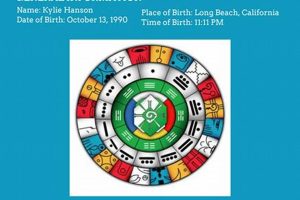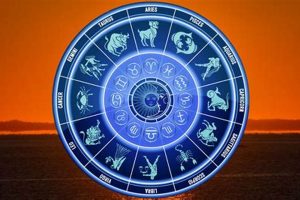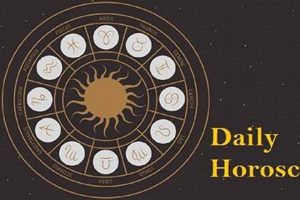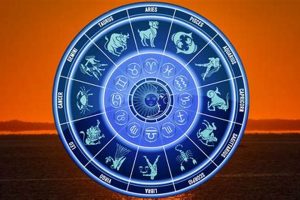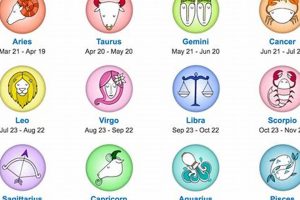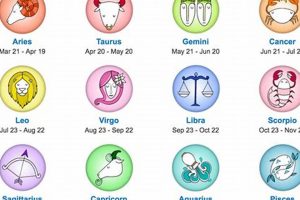The Mayan astrological system offers a unique perspective on personality and destiny, distinct from Western astrology. It uses a complex calendar system, including the Tzolkin (sacred calendar) and the Haab (civil calendar), to determine an individual’s day sign, which influences their characteristics and life path. For example, a person born on a day associated with the serpent deity, Kan, might be seen as wise and intuitive.
This ancient practice provides a framework for understanding one’s strengths, weaknesses, and purpose. By exploring the intricacies of the Mayan calendar and its associated deities, individuals can gain valuable self-awareness and insight into their potential. Rooted in a rich cultural heritage, this system offers a connection to a sophisticated civilization and its enduring wisdom. Its enduring presence underscores a timeless human desire to understand the self and one’s place in the cosmos.
This exploration delves deeper into the various aspects of Mayan astrology, including the meanings of the different day signs, the interplay between the Tzolkin and Haab calendars, and the significance of the Mayan deities in shaping individual destinies. Further investigation will illuminate the rich tapestry of this complex and fascinating system.
Tips for Understanding One’s Mayan Astrological Sign
These tips offer guidance for navigating the complexities of the Mayan astrological system and gaining a deeper understanding of its significance.
Tip 1: Determine the Birth Date: Accurate interpretation requires precise birth date information. Consulting Mayan calendar conversion tools can assist in determining the corresponding day sign within the Tzolkin calendar.
Tip 2: Research the Day Sign: Each day sign possesses unique characteristics and associations. Exploring resources dedicated to Mayan astrology can provide insights into the specific attributes connected with one’s day sign.
Tip 3: Consider the Haab Calendar: While the Tzolkin governs personality, the Haab calendar provides context related to the solar year. Examining the interplay between these two calendars offers a more comprehensive understanding.
Tip 4: Explore the Mayan Deities: Each day sign aligns with a specific deity. Learning about the mythology and symbolism associated with these deities can illuminate the deeper meaning of one’s sign.
Tip 5: Consult with Experts: Engaging with experienced Mayan astrologers can provide personalized interpretations and guidance for applying these insights to one’s life.
Tip 6: Integrate the Knowledge: Understanding one’s Mayan astrological sign is a journey of self-discovery. Integrating these insights into daily life can lead to greater self-awareness and personal growth.
By following these tips, individuals can gain a deeper understanding of their Mayan astrological sign and its implications for their lives. This knowledge can empower individuals to embrace their strengths, navigate challenges, and live more authentically.
Further exploration of this ancient system offers a path toward greater self-knowledge and a deeper connection to a rich cultural heritage. The following conclusion summarizes the key takeaways of this exploration.
1. Tzolkin Calendar
The Tzolkin calendar forms the foundation of Mayan astrology, serving as a crucial tool for understanding personality traits, life cycles, and spiritual connections. This sacred 260-day calendar, distinct from the solar Haab calendar, provides a framework for interpreting individual destinies within the Mayan cosmological system. Its structure and symbolism offer valuable insights into the cyclical nature of time and the interconnectedness of all beings.
- The 20 Day Signs:
The Tzolkin comprises 20 unique day signs, each representing distinct energies and characteristics. These signs, such as Imix (creation), Ik (wind), and Ahau (sun), provide a symbolic language for understanding individual personalities and predispositions. For example, individuals born on the day of Ik might be intellectually inclined and possess a strong connection to the spiritual realm. Each day sign provides a lens through which to interpret one’s inherent strengths and challenges.
- The 13 Numbers:
Combined with the 20 day signs are 13 numbers, creating a continuous cycle of 260 unique combinations (1 Imix, 2 Ik, 3 Akbal, etc.). These numbers contribute an energetic layer to the day signs, influencing the intensity and expression of their qualities. For instance, a 7 Manik combination would carry a different energy than a 12 Manik, even though both share the base characteristics of Manik (deer).
- The Sacred Cycle:
The 260-day cycle represents the gestation period of humans and also aligns with various natural cycles observed by the Mayans, such as the growth cycle of maize. This cyclical nature emphasizes the interconnectedness of life and the continuous flow of energy within the cosmos. The Tzolkin provides a framework for understanding these cycles and their influence on individual lives.
- Divination and Prophecy:
The Tzolkin serves as a tool for divination and prophecy, offering insights into auspicious and challenging periods. By understanding the energies associated with specific Tzolkin days, individuals could make informed decisions about important events, such as planting crops or embarking on journeys. This practice emphasizes the importance of aligning oneself with the natural rhythms of the universe.
Understanding the Tzolkin calendar is essential for interpreting Mayan astrological information. By exploring the interplay of the day signs, numbers, and the cyclical nature of the calendar, individuals can gain profound insights into their inherent nature and potential for spiritual growth. The Tzolkin offers a powerful framework for self-discovery and connection to the wisdom of the ancient Mayan civilization.
2. Day Signs (K'in)
Day Signs, known as K’in in the Mayan language, represent fundamental building blocks within the Mayan astrological system. Each individual possesses a specific Day Sign determined by their birth date within the Tzolkin calendar. These signs offer profound insights into personality, strengths, weaknesses, and life purpose. Understanding one’s Day Sign is crucial for navigating the complexities of Mayan astrology and gaining a deeper understanding of the self within a broader cosmological context.
- Symbolic Meanings:
Each of the 20 Day Signs embodies unique symbolic meanings, often associated with natural elements, animals, or deities. For example, Imix symbolizes primordial waters and the creative force, while Chicchan represents the serpent and embodies primal energy. These symbolic associations provide a rich tapestry of meanings that contribute to the overall interpretation of an individual’s astrological profile.
- Personality Traits:
Day Signs are believed to influence personality traits and behavioral patterns. Individuals born under the sign of Oc (dog) are often described as loyal and protective, while those born under Men (eagle) might display leadership qualities and a strong sense of vision. These associations provide a framework for understanding individual strengths and tendencies.
- Life Path and Destiny:
Day Signs are not merely static descriptors of personality; they also offer insights into an individual’s life path and potential challenges. Certain Day Signs are associated with specific life lessons or karmic patterns. Understanding these associations can empower individuals to navigate their life journey with greater awareness and purpose.
- Interaction with the Tzolkin Calendar:
Day Signs are intrinsically linked to the Tzolkin calendar. The combination of the Day Sign with the accompanying number (1-13) creates a unique energetic signature that further refines the individual’s astrological profile. This interplay between the Day Sign and the Tzolkin count provides a nuanced and dynamic understanding of one’s place within the Mayan cosmos.
By exploring the intricacies of Day Signs, individuals can unlock valuable self-knowledge and gain a deeper appreciation for the complexity of Mayan astrology. These signs, when interpreted within the context of the Tzolkin calendar and associated deities, provide a comprehensive roadmap for understanding one’s unique place within the universe and fulfilling one’s inherent potential.
3. Mayan Deities
Mayan deities play an integral role in the interpretation and understanding of Mayan astrology. Each day sign within the Tzolkin calendar aligns with a specific deity, imbuing the sign with unique characteristics and influencing the individual born under its auspices. Exploring these deities provides a deeper understanding of the energies and forces at play within Mayan astrology, offering a richer interpretation of one’s birth sign and its implications.
- Patron Deities and Day Signs:
Each day sign has a patron deity who governs its energies and influences the personality traits associated with that sign. For instance, the day sign Imix is associated with Itzamn, the creator deity, signifying creativity and leadership. Understanding the attributes of the patron deity provides deeper insight into the inherent strengths and challenges of individuals born under a specific day sign. Knowledge of these deities expands the understanding of one’s astrological profile beyond the basic characteristics of the day sign itself.
- Divine Influence on Destiny:
Mayan deities are not simply symbolic figures; they represent powerful forces that can shape individual destinies. The deity associated with one’s day sign is believed to exert influence throughout life, offering guidance, protection, and challenges. For example, those born under the sign of K’awil, associated with the lightning deity, might experience a life path marked by sudden changes and transformative events. Recognizing the influence of one’s patron deity can provide valuable context for navigating life’s journey.
- Ritual and Ceremony:
Mayan rituals and ceremonies often invoke specific deities, providing a means of connecting with their energies and seeking their guidance. By understanding the role of deities in these practices, individuals can gain a deeper appreciation for the spiritual dimensions of Mayan astrology. These rituals offer a practical application of astrological knowledge, allowing individuals to actively engage with the energies represented by their day signs and associated deities.
- Mythology and Symbolism:
Mayan mythology provides a rich tapestry of stories and symbols that illuminate the nature and influence of the deities. Exploring these narratives offers a deeper understanding of the forces at play within Mayan astrology. For instance, the myths surrounding the Hero Twins provide insights into the struggle between light and darkness, a theme reflected in the interplay of various day signs and their associated deities. Understanding these narratives adds depth and complexity to the interpretation of individual astrological profiles.
The Mayan pantheon provides a crucial framework for interpreting the complexities of Mayan astrology. By understanding the roles, influences, and symbolic meanings of the deities, individuals can gain a more profound understanding of their own day signs, life paths, and spiritual connections within the Mayan cosmological system. This exploration of the deities enriches the practice of Mayan astrology, moving beyond simple descriptions of personality traits to a deeper understanding of the interconnectedness of all beings within the cosmos.
4. Haab Calendar
The Haab calendar, a 365-day solar calendar, plays a crucial, albeit often overlooked, role within the broader context of Mayan astrology. While the Tzolkin calendar governs personality traits and inherent energies, the Haab provides a framework for understanding one’s connection to the cycles of nature and the solar year. The interplay between these two distinct calendars creates a complex web of astrological influences that shapes individual destinies. The Haab, divided into 18 months of 20 days each, with a five-day period known as Wayeb’, offers a different lens through which to interpret one’s place within the Mayan cosmos. For example, a person born during the month of Pop, associated with community and leadership, might experience a heightened sense of social responsibility. This interaction between the Haab and Tzolkin calendars adds another layer of depth and nuance to Mayan astrological interpretations.
The Haab’s significance lies in its grounding in the observable cycles of the natural world. Its alignment with the solar year provides a practical framework for understanding seasonal changes and agricultural cycles. This connection to the physical world complements the more esoteric nature of the Tzolkin calendar, creating a balanced perspective that integrates both spiritual and practical considerations. The Haab’s influence can be seen in the timing of Mayan agricultural practices and ceremonies, demonstrating the practical application of this calendrical system. For instance, ceremonies honoring specific deities associated with particular Haab months would be conducted during those times to ensure successful harvests and community well-being. This demonstrates the integral role of the Haab calendar within Mayan society and its influence on daily life.
Understanding the Haab calendar, in conjunction with the Tzolkin, provides a more holistic and nuanced understanding of Mayan astrology. While the Tzolkin reveals individual predispositions and inherent energies, the Haab contextualizes these traits within the framework of the solar year and the cycles of nature. This combined perspective offers valuable insights into the interplay between individual destinies and the broader forces of the cosmos. Challenges in understanding the Haab often stem from its difference from the Gregorian calendar, requiring careful conversion and interpretation. However, the insights gained from understanding its influence within Mayan astrology offer a deeper appreciation for the intricate and sophisticated nature of this ancient system.
5. Personal Interpretations
Personal interpretations within Mayan astrology provide a framework for understanding individual destinies and navigating life’s complexities. Unlike generalized astrological readings, personal interpretations delve into the specific interplay between an individual’s birth date, corresponding Tzolkin and Haab calendar positions, and associated deities. This personalized approach offers unique insights into one’s strengths, weaknesses, and potential life path.
- Navigating Life Challenges:
Personal interpretations can offer guidance for navigating life challenges by providing insights into potential obstacles and opportunities. For example, an individual born under a day sign associated with introspection might be advised to cultivate stronger communication skills to overcome potential social challenges. Understanding these predispositions can empower individuals to proactively address potential difficulties.
- Understanding Relationships:
Mayan astrology can offer insights into relationship dynamics by comparing the day signs of individuals. Certain combinations of day signs are considered more compatible than others. This information can provide valuable context for understanding interpersonal relationships and navigating potential conflicts. For example, individuals with compatible day signs might find it easier to communicate and understand each other’s perspectives. Personal interpretations provide a nuanced understanding of relationship dynamics within a Mayan astrological framework.
- Career and Purpose:
Personal interpretations can provide guidance regarding career choices and life purpose. Certain day signs are associated with specific skills and aptitudes. This information can assist individuals in identifying career paths that align with their inherent strengths. For example, a person born under a day sign associated with creativity might be drawn to artistic pursuits. Personal interpretations can illuminate potential career paths and provide clarity regarding one’s life purpose.
- Spiritual Growth:
Mayan astrology offers a framework for spiritual growth by providing insights into one’s karmic lessons and spiritual path. Each day sign carries specific energetic influences that can contribute to personal evolution. Understanding these influences can empower individuals to embark on a path of self-discovery and spiritual development. Personal interpretations provide a roadmap for spiritual growth within the context of Mayan cosmology. For example, understanding the symbolism associated with one’s day sign can illuminate areas for personal growth and development.
Personal interpretations within Mayan astrology offer a powerful tool for self-discovery and personal empowerment. By integrating these insights, individuals can gain a deeper understanding of their strengths, weaknesses, and life purpose, allowing them to navigate life’s challenges with greater awareness and intention. This personalized approach to Mayan astrology provides a unique and valuable perspective on the individual’s journey through life, offering guidance and support for achieving one’s full potential.
6. Spiritual Growth
Mayan astrology offers a unique framework for spiritual growth, distinct from other astrological traditions. It emphasizes the cyclical nature of time, the interconnectedness of all beings, and the importance of aligning oneself with the energies of the cosmos. This system provides a roadmap for self-discovery and spiritual evolution, utilizing the Tzolkin calendar, day signs, and associated deities to illuminate an individual’s path toward greater self-awareness and spiritual understanding. This framework encourages introspection and self-reflection, fostering a deeper understanding of one’s purpose within the larger cosmic order.
- Self-Discovery through Day Signs:
Each day sign within the Tzolkin calendar carries specific energetic influences that provide insights into an individual’s strengths, weaknesses, and karmic lessons. For instance, individuals born under the sign of Eb, associated with the path and the rain deity Chac, might be drawn to exploration and spiritual seeking. Understanding one’s day sign provides a starting point for self-discovery and facilitates the identification of areas for personal growth.
- Alignment with Cosmic Cycles:
The Mayan calendar system emphasizes the cyclical nature of time and the importance of aligning oneself with these natural rhythms. By understanding the energies associated with specific periods within the Tzolkin and Haab calendars, individuals can make informed decisions and navigate life’s transitions with greater awareness. For example, undertaking new ventures during a time associated with growth and abundance might yield more favorable outcomes. This practice fosters a sense of harmony with the cosmos.
- Connecting with Mayan Deities:
The Mayan pantheon of deities offers a rich source of guidance and inspiration for spiritual growth. Each deity embodies specific energies and qualities that individuals can cultivate within themselves. For instance, connecting with Ixchel, the goddess of weaving and medicine, might inspire creativity and healing. Developing a relationship with these deities can deepen one’s spiritual practice.
- Ancestral Wisdom and Lineage:
Mayan astrology provides a connection to an ancient lineage of wisdom and spiritual practice. By engaging with this system, individuals gain access to a rich tradition of self-knowledge and cosmological understanding. This connection to ancestral wisdom can foster a sense of belonging and provide a deeper understanding of one’s place within the larger tapestry of existence.
Mayan astrology provides a powerful framework for spiritual growth by offering tools for self-discovery, alignment with cosmic cycles, connection with deities, and access to ancestral wisdom. By integrating these elements, individuals can embark on a journey of self-transformation and spiritual evolution, cultivating greater self-awareness, purpose, and connection to the cosmos. This system offers a unique and profound approach to spiritual development, rooted in a rich cultural heritage and a deep understanding of the interconnectedness of all beings.
Frequently Asked Questions about Mayan Astrology
This section addresses common inquiries regarding Mayan astrology, providing clear and concise explanations to foster a deeper understanding of this complex system.
Question 1: How does Mayan astrology differ from Western astrology?
Mayan astrology, based on the Tzolkin and Haab calendars, emphasizes day signs and their associated deities, offering a distinct perspective on personality and destiny compared to Western astrology’s focus on planetary influences and zodiac signs.
Question 2: What is a Mayan day sign?
A Mayan day sign, or K’in, represents one of 20 unique energies within the Tzolkin calendar, influencing personality traits, strengths, and life path. Each individual possesses a specific day sign based on their birth date.
Question 3: How is the Tzolkin calendar used in Mayan astrology?
The 260-day Tzolkin calendar, combined with the 365-day Haab calendar, forms the basis of Mayan astrological calculations. The Tzolkin reveals an individual’s day sign and its associated characteristics.
Question 4: What role do Mayan deities play in this astrological system?
Mayan deities are intrinsically linked to the day signs. Each day sign has a patron deity who imbues it with specific energies and influences the individual born under that sign.
Question 5: How can one determine their Mayan day sign?
Various online resources and Mayan calendar converters can determine one’s day sign based on their Gregorian birth date. Consulting with an expert in Mayan astrology can provide more in-depth interpretations.
Question 6: How can Mayan astrology be used for personal growth?
Mayan astrology offers insights into one’s strengths, weaknesses, and life purpose. By understanding these influences, individuals can gain self-awareness, navigate challenges, and make informed decisions to foster personal and spiritual development.
Understanding these key aspects of Mayan astrology provides a foundation for further exploration of this rich and complex system. Continued learning can offer deeper insights into the self and the interconnectedness of all beings within the Mayan cosmos.
The following section offers further resources for those interested in delving deeper into Mayan astrology.
My Mayan Astrology
This exploration has provided a foundational understanding of Mayan astrology, highlighting its core components: the Tzolkin and Haab calendars, day signs (K’in), associated deities, and the significance of personal interpretations for spiritual growth. The intricate interplay between these elements offers a unique framework for understanding personality, navigating life’s complexities, and connecting with a rich ancestral heritage. From determining one’s day sign to exploring the influence of patron deities, Mayan astrology presents a comprehensive system for self-discovery.
The enduring legacy of Mayan astrology underscores a timeless human desire to understand the self and one’s place within the cosmos. Further exploration of this intricate system offers continued opportunities for self-reflection, spiritual growth, and connection to the wisdom of an ancient civilization. This journey of discovery invites continued exploration and contemplation of the profound insights offered by Mayan astrology.


